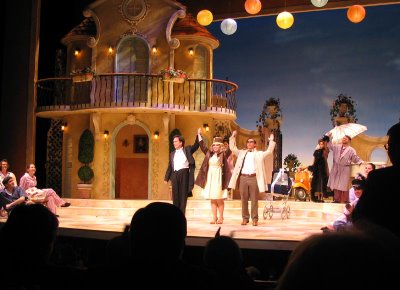Il Matrimonio Segreto, University of Maryland Opera Studio
 Domenico Cimarosa's Il Matrimonio Segreto (Vienna, 1792) is an opera buffa -- it's meant to be fun. The University of Maryland Opera Studio's new production, now playing at the Clarice Smith Performing Arts Center, which updates the story to a 1960s Amalfi Coast villa -- sort of -- insists that this is a fun opera. We have an orange Vespa, it says, and a dancing quartet of beauticians -- isn't that fun? There is a swimming pool on stage -- so fun! Long after I had gotten the point, it kept insisting in the wide-nostriled, bloodshot-eyed manner of the amphetamine addict. Yes, I get it, director Nick Olcott wants to leave no doubt: "Gee, opera is fun" (actual quotation).
Domenico Cimarosa's Il Matrimonio Segreto (Vienna, 1792) is an opera buffa -- it's meant to be fun. The University of Maryland Opera Studio's new production, now playing at the Clarice Smith Performing Arts Center, which updates the story to a 1960s Amalfi Coast villa -- sort of -- insists that this is a fun opera. We have an orange Vespa, it says, and a dancing quartet of beauticians -- isn't that fun? There is a swimming pool on stage -- so fun! Long after I had gotten the point, it kept insisting in the wide-nostriled, bloodshot-eyed manner of the amphetamine addict. Yes, I get it, director Nick Olcott wants to leave no doubt: "Gee, opera is fun" (actual quotation).
Daniel Ginsberg, At Clarice Smith Center, It's Fun, Fun, Fun With Cimarosa (Washington Post, April 24) Stephan Varga, Opera for the students (University of Maryland Diamondback, April 17) |
Of the men, only Kyle Hastings (Count Robinson) disappointed slightly, although with his blond hair and brightly colored suits, regularly changed (costumes by Timm Burrow), and his entrance on the orange Vespa, he certainly cut the figure of a playboy. As Geronimo, Darren Perry was vocally strong and appropriately funny, although I couldn't figure out why a 1960s Italian businessman kept listening to an iPod. (The character is supposed to be hard of hearing: I guess it was a hearing aid.) However, the best singing of the evening came from tenor Tanner Knight as Paolino, with a ringing sound and fine Italian. He is supposed to be Geronimo's young employee, and in this production Knight appeared to be channeling any number of the nerds played by Rick Moranis, an American geek lost in Capri.
 Recitative is the backbone of 18th-century opera, and it is a mystery to me why opera directors feel they have to package it in gimmicks. Gérard Mortier did this to Mozart's Marriage of Figaro in Salzburg -- and last month in Paris, to extensive booing. Last summer, in Santa Fe's Barber of Seville, the recitative player was far too involved in the action. The most important added role in this production was played by Jeffery Watson, who was Massimo the bartender. Watson also served as recitativisto at the poolside baby grand -- white, of course -- which was quite a performance, lacing Cimarosa's score with all sorts of modern references. The modern instrument is the least of my complaints, since this character largely got in the way of the action, all without being actually able to say anything. By the second act, I really wished he would stop his wild, mute gesticulations and just play the piano. I felt the same way about the staging of the overture (choreography by Autumn Mist Belk). Perhaps I am alone in this, but I am capable of listening to an overture for a few minutes without anything to divert my eyes. Next, we will have a 24-hour news channel-style ticker at the bottom of the stage, with sports scores. Is Cimarosa's music really so flimsy?
Recitative is the backbone of 18th-century opera, and it is a mystery to me why opera directors feel they have to package it in gimmicks. Gérard Mortier did this to Mozart's Marriage of Figaro in Salzburg -- and last month in Paris, to extensive booing. Last summer, in Santa Fe's Barber of Seville, the recitative player was far too involved in the action. The most important added role in this production was played by Jeffery Watson, who was Massimo the bartender. Watson also served as recitativisto at the poolside baby grand -- white, of course -- which was quite a performance, lacing Cimarosa's score with all sorts of modern references. The modern instrument is the least of my complaints, since this character largely got in the way of the action, all without being actually able to say anything. By the second act, I really wished he would stop his wild, mute gesticulations and just play the piano. I felt the same way about the staging of the overture (choreography by Autumn Mist Belk). Perhaps I am alone in this, but I am capable of listening to an overture for a few minutes without anything to divert my eyes. Next, we will have a 24-hour news channel-style ticker at the bottom of the stage, with sports scores. Is Cimarosa's music really so flimsy?Don't get the wrong idea. It will be worth your time to hear this rarely performed opera, in the capable hands of conductor Ryan Brown (leading the University of Maryland Symphony Orchestra), and to see Daniel Conway's ingenious set. Performances of Il Matrimonio Segreto continue this evening (April 29, 7:30 pm), and Sunday afternoon (April 30, 3 pm). Tickets are $20 for the general public and only $7 for students. If you plan to take a child to this opera, be aware that the story is basically a sex farce, and that Nick Olcott's production has the bartender end up with the masseur. You wouldn't be prepared to explain that to your 8-year-old if you had only read the libretto.





















































No comments:
Post a Comment